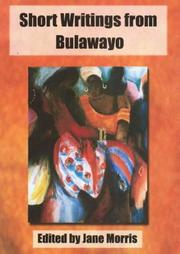
Short writings from Bulawayo
By Jane Morris
Subjects:
Description: Short Writings from Bulawayo is a book of stories, poems and non-fiction pieces that are evocative of Zimbabwe’s second city and its rural surroundings. Some of the contributors are well-known, including John Eppel, Pathisa Nyathi and Terence Ranger, but the majority are published here for the first time. There are 28 pieces in the book from 23 contributors: from men and women, from the different races that make up our society, from people with very different educational backgrounds, from those with urban and rural experiences. Bulawayo’s special character comes from a history of going its own way and developing its own style, as exemplified in the writings presented here. The collection tells of many things: of family and friendship, of fear and death, of witches and spirits, of hunger and drought, of dreams and aspirations, of leaving home and leaving Zimbabwe, of queues and loneliness, of football and bicycles, of growing old and of love. A unifying theme of many of the stories and poems is loss – of innocence, of purpose, of love, of culture, of belonging, of life. A reflection of our times. Most of the writings are set in the homes, streets and bars of present day Bulawayo, or in the surrounding rural areas. We also get a glimpse through the eyes of the writers into the lives of different people at different times – from Makokoba in the 1920s, through Thorngrove of the 1950s to rural Matabeleland in the 1960s and 1980s. The collection takes us from the elegiac quality of John Eppel’s poem Rain in Winter to the rumbustious energy of Spencer Crewe’s short story The Little House; from the scholarly writing of Terence Ranger to the fertile imaginations of Christopher Mlalazi and Farai Mpofu. Some of the stories and poems will make you sad and some will make you smile. The pieces were chosen for their good writing, but also to reflect and celebrate the diversity of life in Zimbabwe. The inspiration for the book was to give voice to new writers who might otherwise be unheard and, through their writing, to bring together the different communities that make up Bulawayo – to show that there is more to unite us than to divide us.
Comments
You must log in to leave comments.